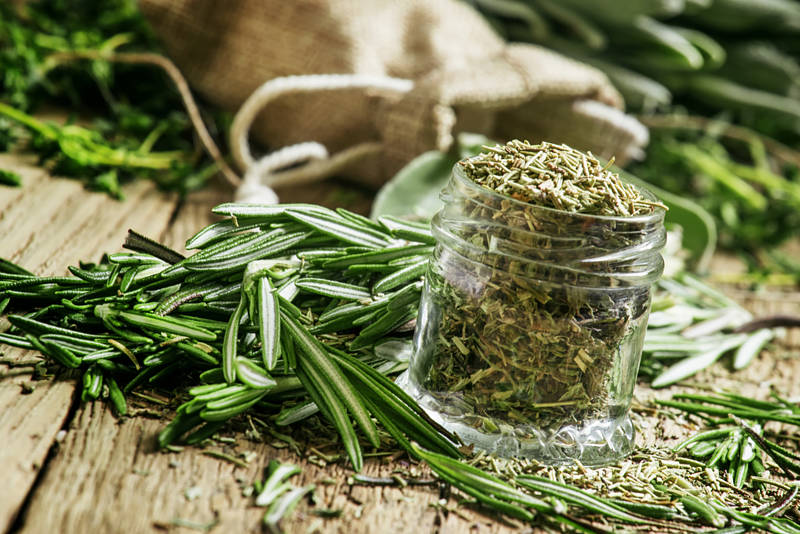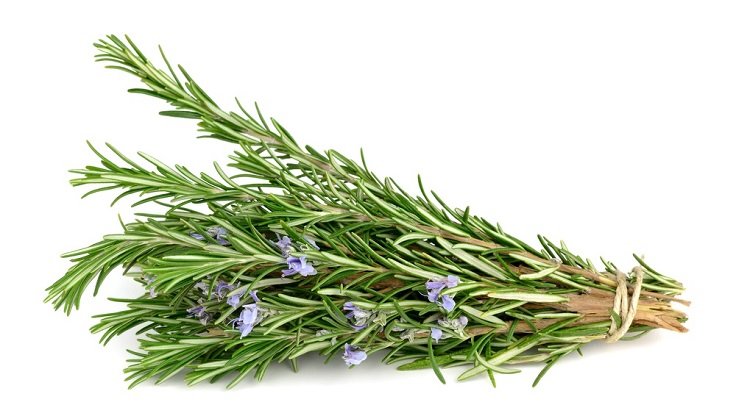13 alternative uses you can give rosemary

When you think of rosemary, you can imagine those spiky herbs you find in the spice aisle at your local grocery store. While not everyone loves dry-looking herbs, fresh rosemary is a very aromatic and flavorful addition to many dishes and has been a popular herb in cooking for many years with many other uses.

You may be familiar with rosemary incorporated into your dishes, but what you may not know is that this delicious herb has a number of uses, not only in the kitchen, but also in the medicine cabinet, for routine skincare, and in the home in general.
Table of Contents
Uses of rosemary in the kitchen
By way of introduction, some of the main uses of rosemary in the kitchen and for dishes are mentioned.
1. In vinegars and oils
Infusing rosemary vinegar or oil is a delicious and simple way to preserve the flavor of rosemary without spoiling the herb.
Both can be used in any recipe that calls for oil or vinegar, and the oil can be used as a delicious topping for hot, crusty bread.
2. Sauces and Soups
Whole sprigs of rosemary can easily be tossed into any soup, stew, sauce, or marinade to add a hint of flavor.
Rosemary pairs well with many other ingredients such as citrus, butter, oil, balsamic, garlic, and pepper, and is especially good in more hearty soups with root vegetables like potatoes, parsnips, sweet potatoes, and carrots.
3. Herb butter
Flavored butter can add a whole new dimension to your kitchen, and it’s a delicious alternative to regular butter on a hot piece of bread. Besides it’s easy to make! This Rosemary Garlic Butter recipe is just one example of a delicious butter infusion.
4. Drinks with rosemary
A flavorful touch can be added to some of our favorite drinks, both alcoholic and non-alcoholic. Whether you’re trying to spice up a simple glass of water or want to impress your guests with a unique cocktail, rosemary makes a great addition to many drinks.
5. Rosemary for dessert
Rosemary pairs very well with sweeter fruits and flavors like lemon and apple and can even be paired with dark chocolate for a surprisingly elegant dessert, like in rosemary and dark chocolate butter bars.
How to use rosemary medicinally
The herb has been hailed since ancient times for its medicinal properties. Rosemary was traditionally used to help relieve muscle pain, improve memory, boost the immune and circulatory system, and promote hair growth.
1. Relieves anxiety and stress
There have been some studies that have shown that inhaling rosemary oil decreases the pulse rate during stressful situations (such as test writing). Since pulse rates reflect short-term stress, rosemary oil can help reduce stress naturally.
In another study, participants who smelled rosemary oil for five minutes had 23% lower levels of the stress hormone cortisol in their saliva than those who did not.
2. Improves brain function
Although more research is needed to confirm this, there has been some research showing that inhaling rosemary oil helps prevent the breakdown of acetylcholine, which is a chemical in our brain that is important for thinking, concentration, and memory.
Additionally, there is some research to suggest that breathing rosemary oil may help improve brain function in patients with dementia or Alzheimer’s disease.
3. Powerful anti-inflammatory
Rosemary tea contains rosmarinic acid and carnosic acid, which are polyphenolic compounds that demonstrate antioxidant and anti-inflammatory activity.
These compounds also have antimicrobial properties to help fight infection and have even shown potential to slow the growth of cancerous tumors.
4. Pain relief
There has been an animal study suggesting that rosemary oil may be a slightly more effective pain reliever than acetaminophen.
Another study in stroke survivors with shoulder pain also showed benefits. Participants experienced a 30 percent reduction in pain after combining rosemary aromatherapy with acupuncture. This compared to 15 percent for those who only received acupuncture treatment.
5. Reduces joint inflammation
More research is needed on the impact of rosemary on joint inflammation, but there is some preliminary evidence to suggest that rosemary oil may help reduce tissue inflammation associated with pain and swelling by stopping the migration of joints. white blood cells to injured tissues to release inflammatory chemicals.
This could be potentially beneficial for people with rheumatoid arthritis.
Uses of rosemary in our body
As you could imagine, rosemary also provides benefits for the skin and hair, which is why some of its benefits for body care will be mentioned below.
1. Stimulates hair growth
The rosemary oil can treat androgenetic alopecia (male pattern baldness) to the prevent a byproduct of testosterone attack hair follicles, and has been shown to massage rosemary oil on the scalp twice a day stimulates the regeneration of hair.
2. Increase circulation
If you have problems with Raynaud’s disease (which makes circulation difficult), or you just find that your hands and feet are always cold, massaging a rosemary oil mixture into your hands can help warm them up.
Rosemary oil may help expand your blood vessels, warming the blood so it reaches your fingers and toes more easily.
3. Fight acne
Rosemary’s antibacterial and antimicrobial properties make it particularly beneficial in treating many skin problems. Whole plant rosemary extract has been shown to reduce inflammation associated with acne and fight bacteria that cause breakouts.
While many of the benefits of rosemary require further study, it is generally considered safe to use and has very few side effects. Remember that when you use rosemary extract or oil, it is highly concentrated, so you only need a few drops. Rosemary essential oil should not be used internally and should generally be diluted in a solution or carrier oil when applied to the skin.


